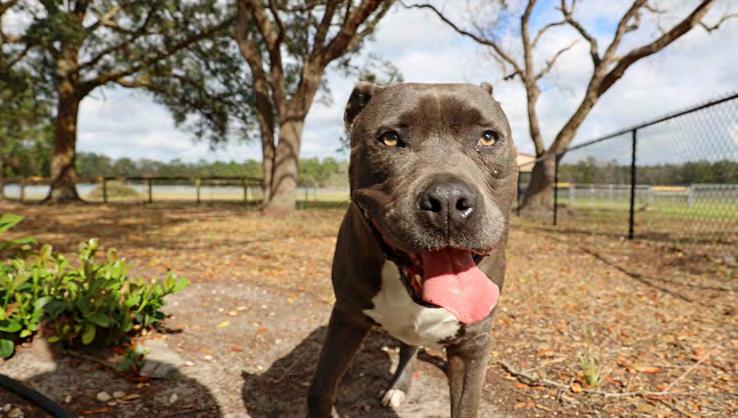
6 minute read
Gone to the Dogs
BY BRAD ROGERS | PHOTOGRAPHY BY RALPH DEMILIO
VOCAL has changed the approach to animal welfare in Marion County
Advertisement
It all started with a puppy named Mabel. Mabel was an abused and neglected 4-month-old pit bull puppy that was rescued and taken to the Humane Society of Marion County. Linda Norman, meanwhile, was a Humane Society board member and volunteer dog walker.
One day, Norman decided to take Mabel for a walk, or try to.
“It was obvious that she had been horribly abused,” said Norman, who at the time worked as a financial planner. “When I went to walk her, she shut down from fear. I took it slow, and she gradually realized that I was not going to hurt her.
“One day, while her head was still hung low, I saw a faint thump of her tail. She wanted to trust me. She looked up at me with hope and fear in her eyes. My heart broke and I resolved to help her and others like her.
“Mabel and I became friends and spent many happy moments together. My life was changed from that day forward.”
And as Norman’s life changed, so did the lives of countless animals she had vowed to help — as did the philosophy about animal welfare in Marion County, thanks to advocacy, then activism by her and others.
Norman began delving into what was happening to unwanted pets in Marion
County. What she found was shocking.
First, there was the number of animals being euthanized, some 6,000 a year at the time, according to Norman. There was also no protection for dogs chained in yards, no matter how long they were left there and under what conditions. And, for good measure, it was illegal to feed feral and community cats.
“Ironically, cruelty was legal, and kindness was not. Change was clearly needed,” Norman said.
In 2011, Norman formed a committee. Its members went to work on the chaineddog issue. Meanwhile, two veterinarians, Drs. Kat Fleck and Sarah Kirk, simultaneously pursued getting a new cat ordinance adopted by the County Commission.
The cat ordinance was the easier sell and was adopted that year. It took three more years of prodding before the County Commission, in 2014, approved an ordinance protecting dogs from being left chained unattended and uncared for.
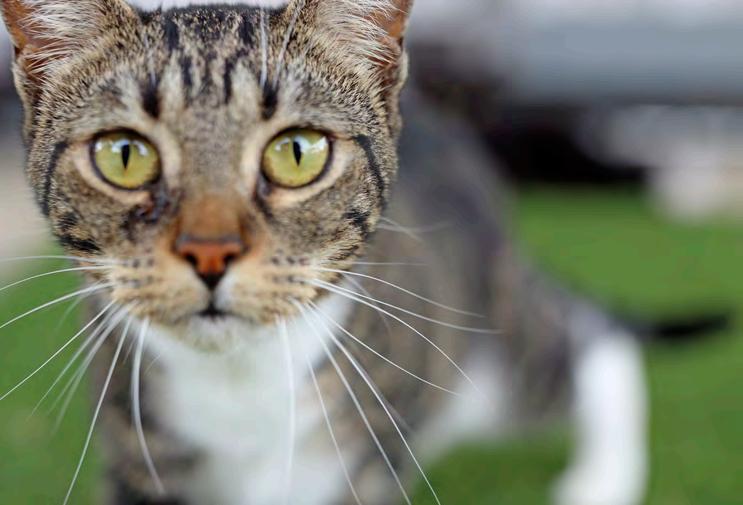
“The key was bringing together various interested stakeholders in the community, including law enforcement, educating the community about the inadequacy of animal protection laws and engaging the media to tell our story,” Norman said.
During those three years of battling to free chained dogs, Norman and her fellow animal advocates didn’t sit idly by. They went to work helping to free dogs from chains in another way – by helping dog owners fence their yards. Forty-five yards in all were fenced, thanks to a grant from the Banfield Foundation.
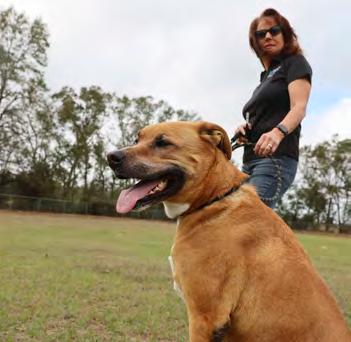
But Marion County’s pet overpopulation — and the high kill rate of homeless dogs and cats — remained a nagging problem.
So, Norman and two friends, Lauren Carpenter and Kate Rengel, decided to take the next step and form an organization to promote not just animal welfare but widespread spaying and neutering of dogs. The trio brought a good mix of expertise, with Carpenter having a background in human resources, Rengel in finance and Norman in financial planning.
They formed VOCAL (Voices of Change Animal League) … with no money and no facility, just a business plan. No problem.
Norman, Carpenter and Rengel set about raising money to build a spay-andneuter clinic. They quickly found support in the community.
Then in 2016, the group got a big break when a donor gave them a former greyhound breeding and training facility on 22 acres off Southwest 52nd Street in the State Road 200 area. Once again, VOCAL’s message resonated.
“What this place gave us was instant credibility; it was an incredible gift,” Norman told OM as she gave us a tour of the facility.
The group pursued its plan to build a clinic, something that would both address animal welfare and, in time, help meet the long-term business needs of VOCAL.
“The kennels were already there, so we focused on raising money for the clinic,” Norman said. “Once again, this community showed me that people here care about the welfare of animals. The clinic was opened in 2019 and was completely funded with donations, enabling VOCAL to remain debt-free.”
During VOCAL’s efforts to improve its facility and build the clinic, Marion County became a no-kill community. It was a victory for the animal advocates, but it created, or rather exacerbated, an old problem – overcrowded shelters.
“We were happy to see death taken off the table as a solution,” Norman said. “The downside is that all the shelters, including VOCAL, Marion County, the Humane Society and Sheltering Hands, are all at capacity.”
So, VOCAL adjusted its focus once again. With limited shelter space, the organization now helps people keep their pets in their homes rather than surrendering them to a shelter wherever possible. Whether it is vet care or food or behavior training, VOCAL will help pet owners meet those needs, regardless of their ability to pay.
It’s been five years since Marion County became a no-kill community and VOCAL is thriving. The clinic, which opened in 2019, has expanded its services beyond spaying and neutering to include other procedures such as mass removals, dental care and others. It is led by veterinarian Dr. Natalie Isaza, a former University of Florida veterinary medicine professor who oversaw the school’s shelter medicine program. Today, Norman said, the clinic keeps VOCAL financially sustainable. Last year alone, the clinic served more than 5,500 animals, including feral and community cats, rescue animals and pets that are owned.
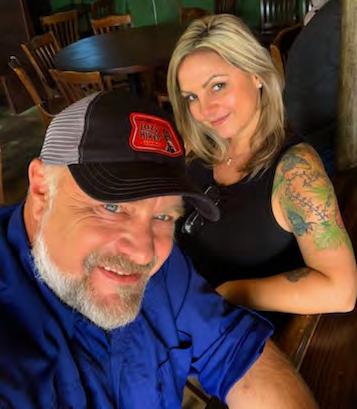
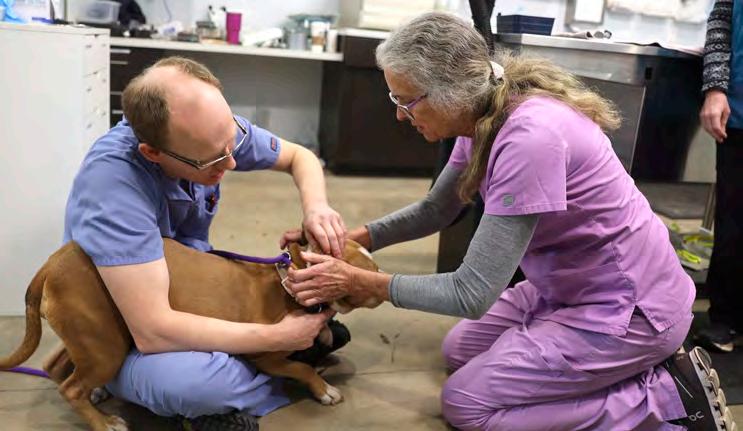
“We didn’t really know if we could find support,” Norman said of VOCAL’s early days. “But we had a business plan, and we knew the clinic would be a steady revenue stream.”
In 2017, VOCAL entered a partnership with Chewy Inc. in which it receives animal food where the packaging is damaged but not the food. R&L Trucking transports the food to VOCAL, which distributes its bounty to about 100 groups.
“We estimate that 12,000 animals are fed each day through the food program,” Norman said. “That way the rescuers and shelters that receive the food can use their food budgets for other needs. So, this has had a far-reaching impact on the animal welfare community.”
Norman is quick to spread the credit for VOCAL’s success.
There are, of course, the long list of supporters and donors who have helped keep the organization and its mission growing, while keeping it debt-free.
Then there is Operations Manager Karen Lancaster, who oversees the ever-growing facility, its 15 employees, more than 50 volunteers and its growing array of services. “Everything we do is touched by her,” Norman said.
And, finally, Norman gushes about her partners, Carpenter and Rengel.
“My partners have put in huge, huge amounts of time and love and effort and passion into making this project succeed,” she said, noting that none of the three founders receive any pay. “We’re all different, and we used those differences to build a better organization. It created a synergy that is rare in any business, nonprofit or profit.”
Carpenter said the speed with which VOCAL has grown was surprising, even for the optimistic among the founding partners.
“I think we all knew we were going to be successful,” she said. “But I think we were definitely surprised by how fast we grew.
Norman said VOCAL’s mission has evolved since its conception, and she expects it will continue to evolve.
“In animal welfare, I don’t think there’s ever been a day that was like any other,” she said.
“I like to joke that I was normal once. Twenty years ago, my husband, Gary, and I had two fluffy dogs and two successful businesses. Now, we are an eight-dog household and I work free for animals. I loved being a financial planner, and I worked hard at it. But my heart went to the dogs when I realized they needed an advocate to do more than speak up for them.”
Yet, for all of VOCAL’s success in achieving the initial goals of Norman, Car- penter and Rengel, Norman said there is still plenty of work to be done.
“What we’ve done, it’s not enough,” Norman said. “The animals of Marion County are still in need. We’re basically dealing with an animal population that covers an area the size of Rhode Island.”
Carpenter said she sees VOCAL continuing to grow and expand as the community does and expects it “to serve more people and more pets.”

“It’s been a very eye-opening experience for me, seeing the state of animal welfare in Marion County,” she said. “Looking back on where we were eight years ago, we’ve made a lot of progress.”
“The need for expanded shelter capacity is now critical as this county is growing fast,” she said. “We take as many animals from the county shelter as we can to help relieve overcrowding, but it is just a drop in the bucket compared to the need.”
The county has plans for a new shelter, but Norman said that is a few years away. So, in the meantime she urges people concerned about animal welfare to volunteer at Marion County Animal Services, saying, “You will change lives and might even change your own.”
She should know. Just ask Mabel.







STOP BLADDER LEAKAGE AND INCONTINENCE WITH
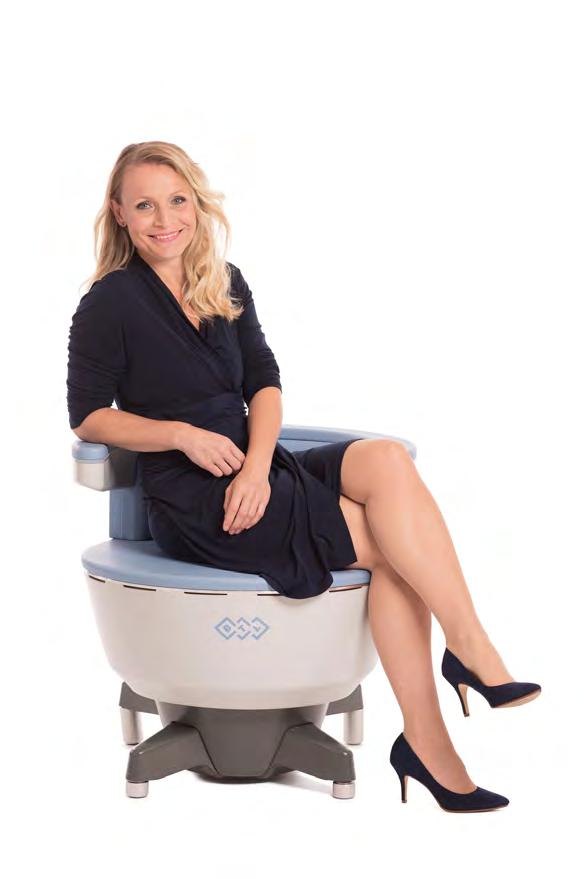
STRONG AND HEALTHY IS THE NEW SEXY!
1920 SW 20TH PLACE | SUITE 202 | OCALA, FL
352-861-0224 | STRONGANDHEALTHYOCALA.COM

CORE

STRENGTHEING LOSE FAT AND GAIN MUSCLE WITH
FACE TIGHTENING AND WRINKLE REDUCTION WITH a beautiful smile begins here


TINA CHANDRA, D.D.S., LVIF, FIAPA Cosmetic, Neuromuscular and Sleep Dentist ... a Physiologic Approach








